SBASSE Minors

In the beginning of Fall 2012, the SBASSE introduced minors in Biology, Chemistry, Computer Science, Mathematics, and Physics. MGSHSS and SDSB students keen to diversify their undergraduate experience in the sciences or SBASSE students wanting to complement their major discipline with another closely related area are encouraged to take full advantage of this new initiative. The minor degree is intended to impart fundamental knowledge in a specific area but carries with it limited depth and breadth. To satisfy degree requirements for a minor, students must accumulate a minimum of 18 credit hours by taking 6 courses in their area of interest and secure a cumulative GPA of 2.75 in them.
All general rules and regulations announced at University level in this Undergraduate Student Handbook must be adhered by students who are interested in obtaining a minor in SBASSE. Courses which are part of major core in an area will not count towards their minor; students must therefore take additional courses in an area, prescribed by a department to fulfil their minor degree requirements.
SBASSE departments offering a minor have provided a menu of compulsory courses, from which a certain number must be taken, in order to qualify for the minor degree. SBASSE students choosing any of the compulsory courses as “SBASSE elective” must take another course from the list, since one course cannot be used simultaneously towards a minor as well as to satisfy SBASSE elective requirement. Additionally, students must take two 300 level courses from the list of elective courses provided by each discipline.
Biology
To obtain a minor in Biology, students must take a minimum 18 credits of courses. Students should note that the SBASSE elective will not double count towards both Biology minor and the SBASSE elective requirement.
Compulsory Courses
From the list of compulsory courses, a student must take at least two courses in addition to BIO 101 and BIO 216 (both deemed as minor “core” courses). SBASSE students choosing any of the compulsory courses as SBASSE elective must take an additional course from the list of compulsory courses. Students should note that the SBASSE elective will not double count towards both Biology minor and SBASSE elective.
- BIO 101: Introductory Biology - 3 credit hours
- BIO 212: Biochemistry* - 3 credit hours
- BIO 216: Molecular Biology - 3 credit hours
- BIO 221: Genetics - 4 credit hours
- BIO 231: Computational Biology I - 3 credit hours
*Biochemistry (BIO 212) will not count towards the minor requirements for students majoring in Chemistry, who take it as part of Chemistry major core.
Optional Courses
Students may take any of the Biology courses, except BIO 100 and BIO 300/ 500 to complete 18 credit hours. However, Biology Courses listed as major requirements of a specific disciple will not double count towards the minor in Biology:
- BIO 313: Cell Biology
- BIO 314: Virology and Microbiology
- BIO 318: Neuroscience
- BIO 331: Computational Biology II
- BIO 415/515: Developmental Biology
- BIO 426/526: Human Genetics
- BIO 432/532: Network Biology
- BIO 521: Gene Regulation and Epigenetics
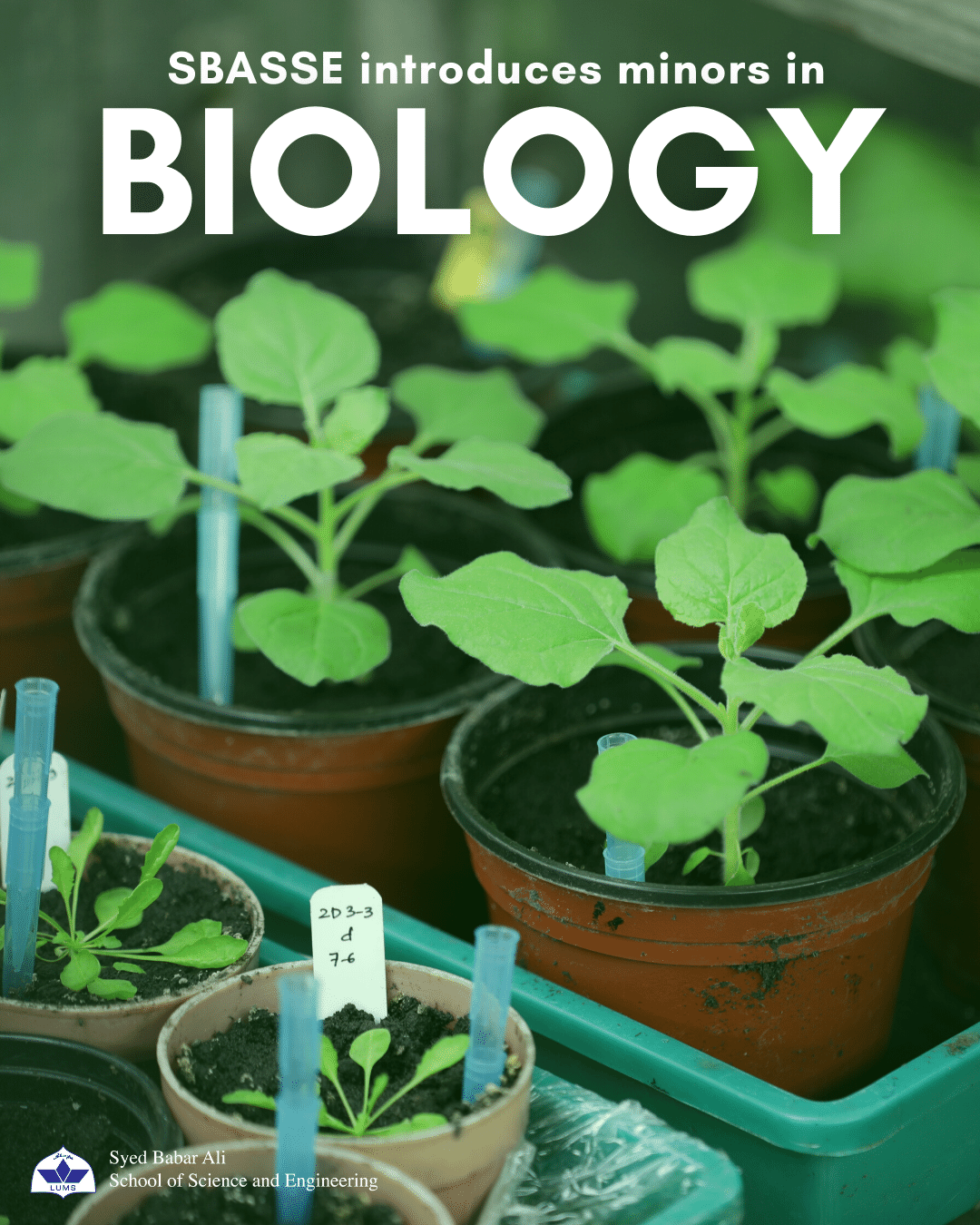
Chemistry
To obtain a minor in Chemistry, students must take a minimum of 6 regular courses (18 to 24 credit hours). As per general policy of minors, double counting of courses is not allowed (i.e., a course can satisfy the requirements of either a major or a minor, but not both). The same rule applies to the SBASSE elective and minor courses as well. Students intending to complete a minor should achieve a minimum cumulative GPA of 2.75 in chemistry courses.
Compulsory Courses
Of the following, Principles of Chemistry (CHEM 101) is a compulsory course and students are required to choose at least two courses from the remaining four. Note that, CHEM 231 would not count as a minor course for Biology major students as it is a part of their major core and they would be required to take two more courses from this list in addition to the compulsory course.
- CHEM 101: Principles of Chemistry - 3 Credit Hours
- CHEM 231: Fundamentals of Organic Chemistry - 3 Credit Hours
- CHEM 324: Inorganic Chemistry I - 3 Credit Hours
- CHEM 314: Quantum Chemistry - 3 Credit Hours
- CHEM 233: Molecular Spectroscopy - 3 Credit Hours
Optional Courses
Students must take a minimum of three elective courses from the following list. Additional course(s) may be required for a minor in chemistry if students are also taking any of the courses as the SBASSE elective or as a part of their major core.
- CHEM 311: Chemical Thermodynamics
- CHEM 313: Special Topics in Physical Chemistry
- CHEM 221: Molecular Symmetry I
- CHEM 342: Analytical Chemistry I
- CHEM 332: Chemistry of the Organic Functional Groups
- CHEM 334: Advanced Organic Chemistry
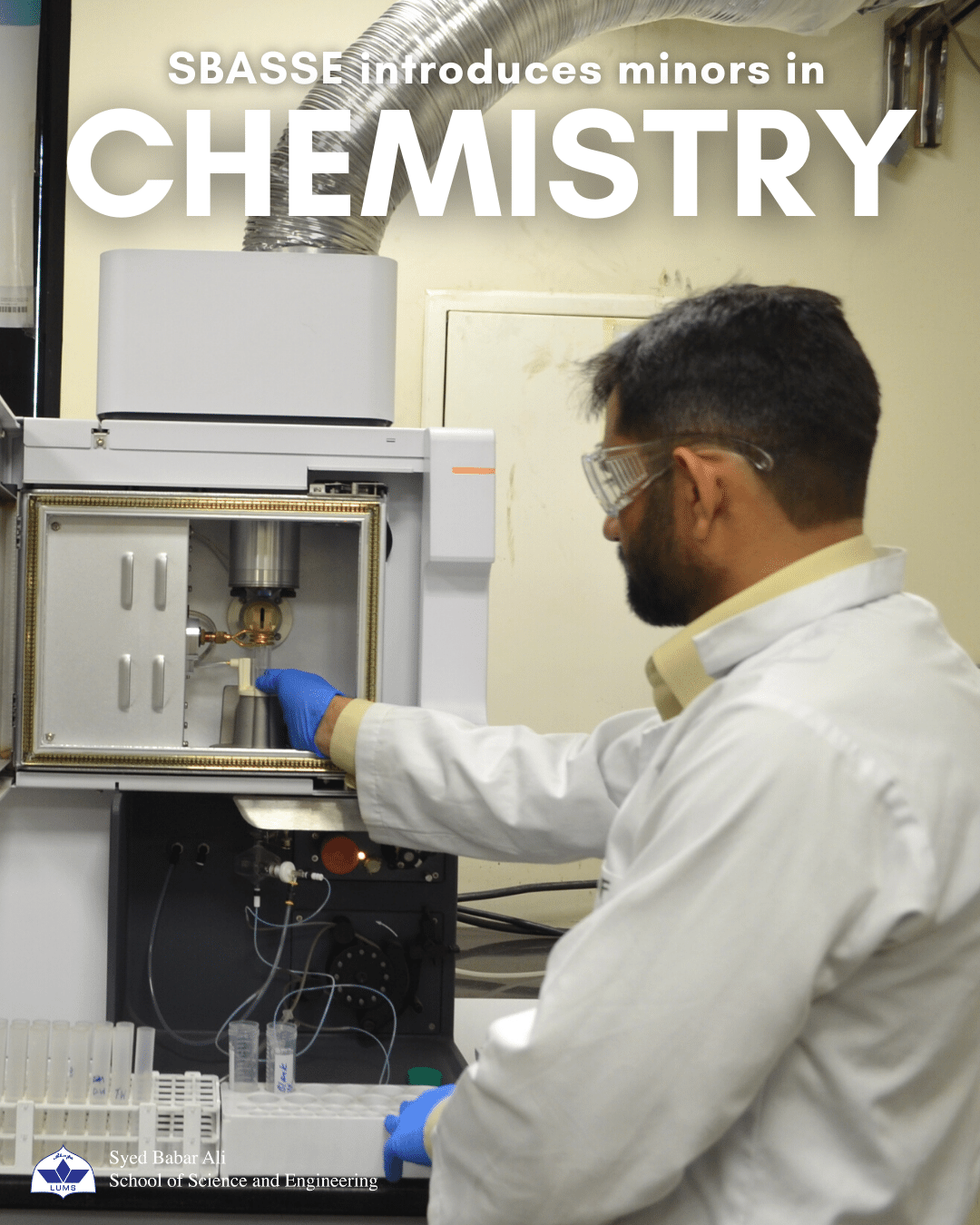
Computer Science
To obtain a minor in Computer Science, students must take a minimum of 6 regular courses (18 to 24 credit hours . 10 Credit hours are of compulsory courses. The rest can be completed by taking three additional CS courses, at least two of which must be 300+ level.
Compulsory Courses
From the list of compulsory courses, a student must take at least one course:
- CS 100: Computational Problem Solving - 3 Credit Hours OR CS 101: Introduction to Computing - 3 Credit Hours
- CS 200: Introduction to Programming - 4 Credit Hours
- CS 202: Data Structures - 3 Credit Hours
Optional Courses
Three additional Computer Science Courses of at least 3 credit hours each are required to complete CS minor. At least two of these optional courses must be of 300 level or above.
Please note:
- Seminar courses, Independent Studies, and Projects will not count towards this requirement.
- Optional courses do not include 100 level CS courses.
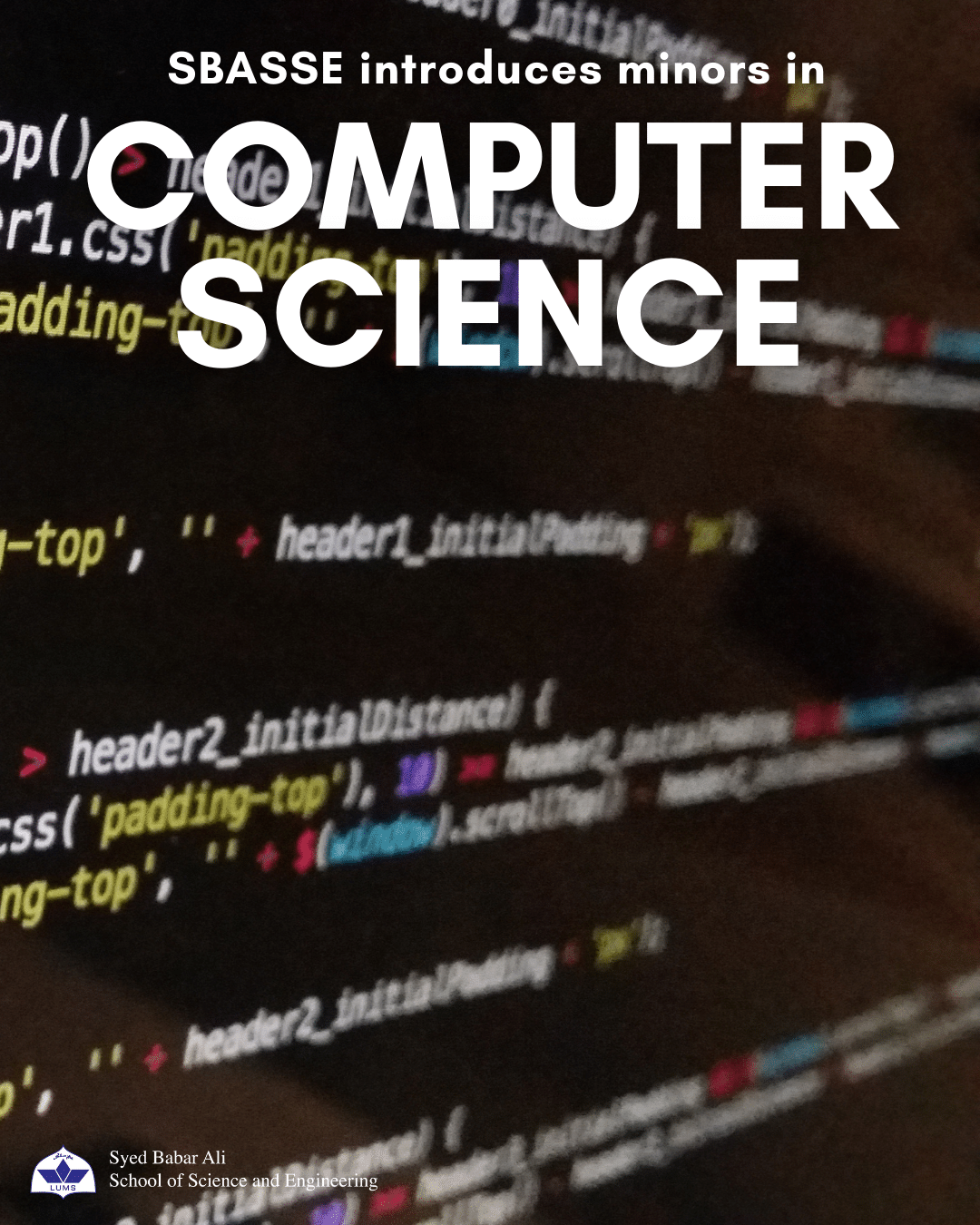
Computer Engineering
The Computer Engineering minor offers students a comprehensive blend of hardware and software courses, providing a well-rounded understanding of computer systems. Beyond the core curriculum covering the fundamentals of computer hardware and software, the program offers an exciting array of elective courses in areas such as embedded systems, hardware security, and parallel programming. This dynamic learning experience at the intersection of hardware and software technologies ensures students are equipped with a diverse skill set in the field. In the following is the computer engineering course structure.
The students will have to successfully complete 6 regular courses in the following combination of core and elective courses.
Pre-requisite required: Introduction to Programming (CS200/ EE 201)
Core courses:
- Digital Logic Circuits and Lab (EE 220) (3+1 Cr Hrs)
- Data Structures (CS 202/EE 202) (3 Cr Hrs) Prereq (CS 200/EE 201)
- Computer Organization and Assembly Language (EE 320, CS 320) (4 Cr Hrs) Prereq (CS 100)
- Operating System (CS 370) (3 Cr Hrs) Prereq (CS 202)
Any two courses from the list of elective courses
Electives:
- Computer Architecture (EE 520/CS 622) (3 Cr Hrs) Prereq (EE 320/324)
- Microprocessor and Interfacing (EE 324) (3+1 Cr Hrs) Prereq (EE 220)
- Digital System Design (EE 421) (3+1 Cr Hrs) Prereq (EE 324/320)
- Embedded Systems (EE 522) (3 Cr Hrs) Prereq (EE 324/320)
- Algorithms (CS310) (3 Cr Hrs) Prereq (CS 210)
- NW Centric Computing (CS 382) (3 Cr Hrs) Prereq (CS 200)
- Hardware Design for IoT Security (EE 5216/CS 595) (3 Cr Hrs) Prereq (CS225 or EE324 or EE/CS320)
- (Other elective courses approved by the focal persons / UGC)
Please note:
- The students who have already taken the core courses as their Major core or Major Electives, would have to take additional courses from the list of elective courses. Only one course can be double counted.

Mathematics
To obtain a minor in Mathematics, students must take a minimum of 6 regular courses (18 to 24 credit hours . Only one of the Mathematics courses in the SBASSE core will count towards minor requirements.
Compulsory Courses
At least one course must be taken out of the following:
- MATH 205: Introduction to Analysis I - 3 Credit Hours
- MATH 320: Algebra I - 3 Credit Hours
- MATH 3010: Advance Calculus - 3 Credit Hours
Beyond one course from the list of compulsory courses, at least 3 credit hours are to be taken from 300/400 level Mathematics courses.
Optional Courses
Students may take any of the Mathematics courses, except MATH 100, to complete 18 credit hours. However, Mathematics courses listed as major requirements of a specific discipline will not double count towards minor in Mathematics.
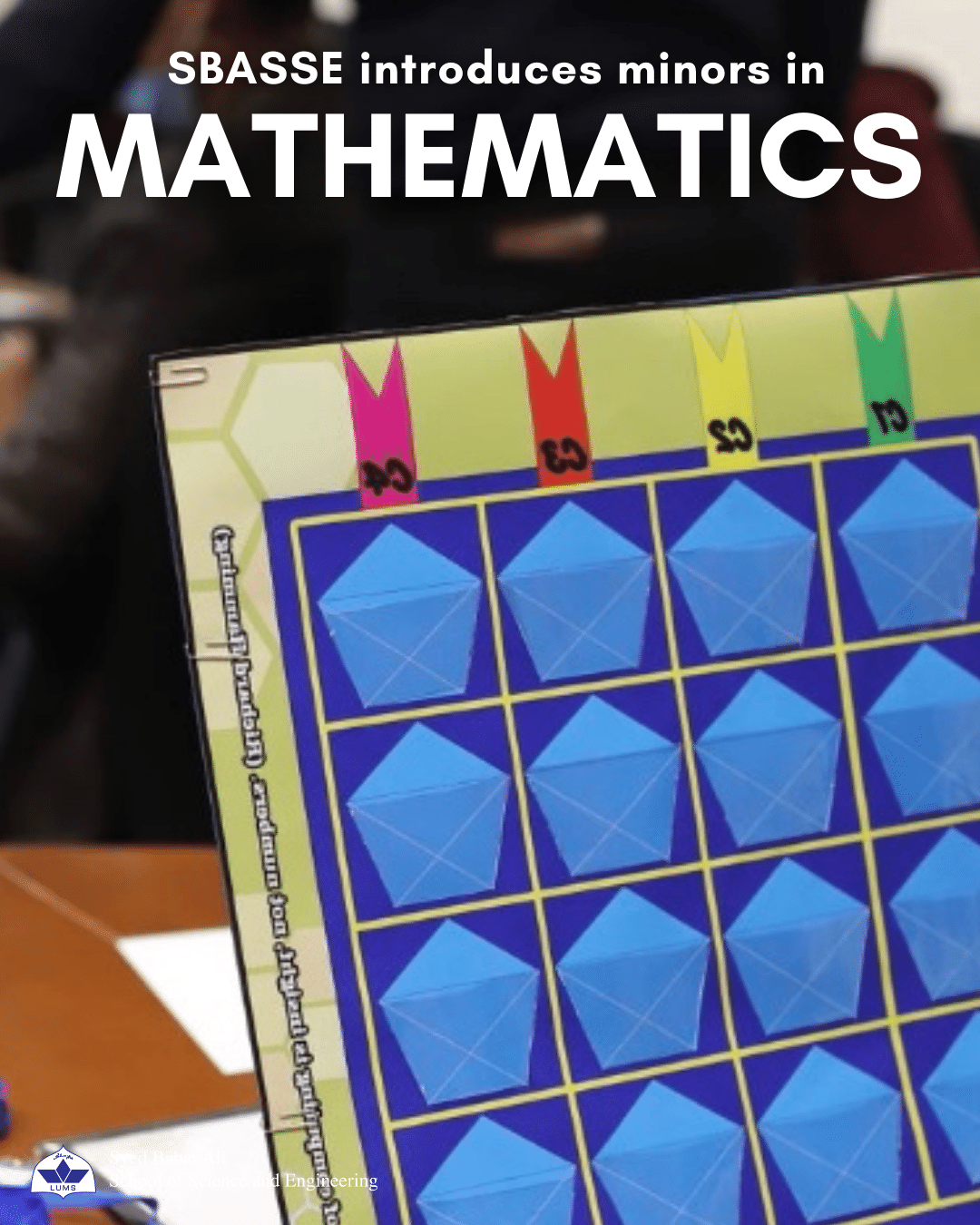
Physics
The Physics minor requires students to take minimum 6 regular courses (18 to 24 credit hours). SBASSE students choosing any of the courses as the SBASSE elective must take an additional physics course of their choice at 200+ level, since the SBASSE elective will not be double counted as part of Physics minor.
Compulsory Courses
From the list of compulsory courses, a student must take at least two courses:
- PHY101: Mechanics* - 4 Credit Hours
- PHY104: Modern Physics* - 4 Credit Hours
- PHY204: Electricity and Magnetism** - 3 Credit Hours
- PHY212: Quantum Mechanics I - 3 Credit Hours
*SBASSE students can only count one of Mechanics and Modern Physics towards their minor requirements. SBASSE students (non-EE) would therefore have to take one additional Physics course at 200+ level to complete the minor credit hour requirements.
**Electricity and Magnetism will not count towards the minor requirements of EE major students who take it as part of EE major core. EE students would need to take two additional Physics courses at 200+ level to complete the minor credit hour requirements.
Optional Courses
Students must take any two 300+ level Physics courses.
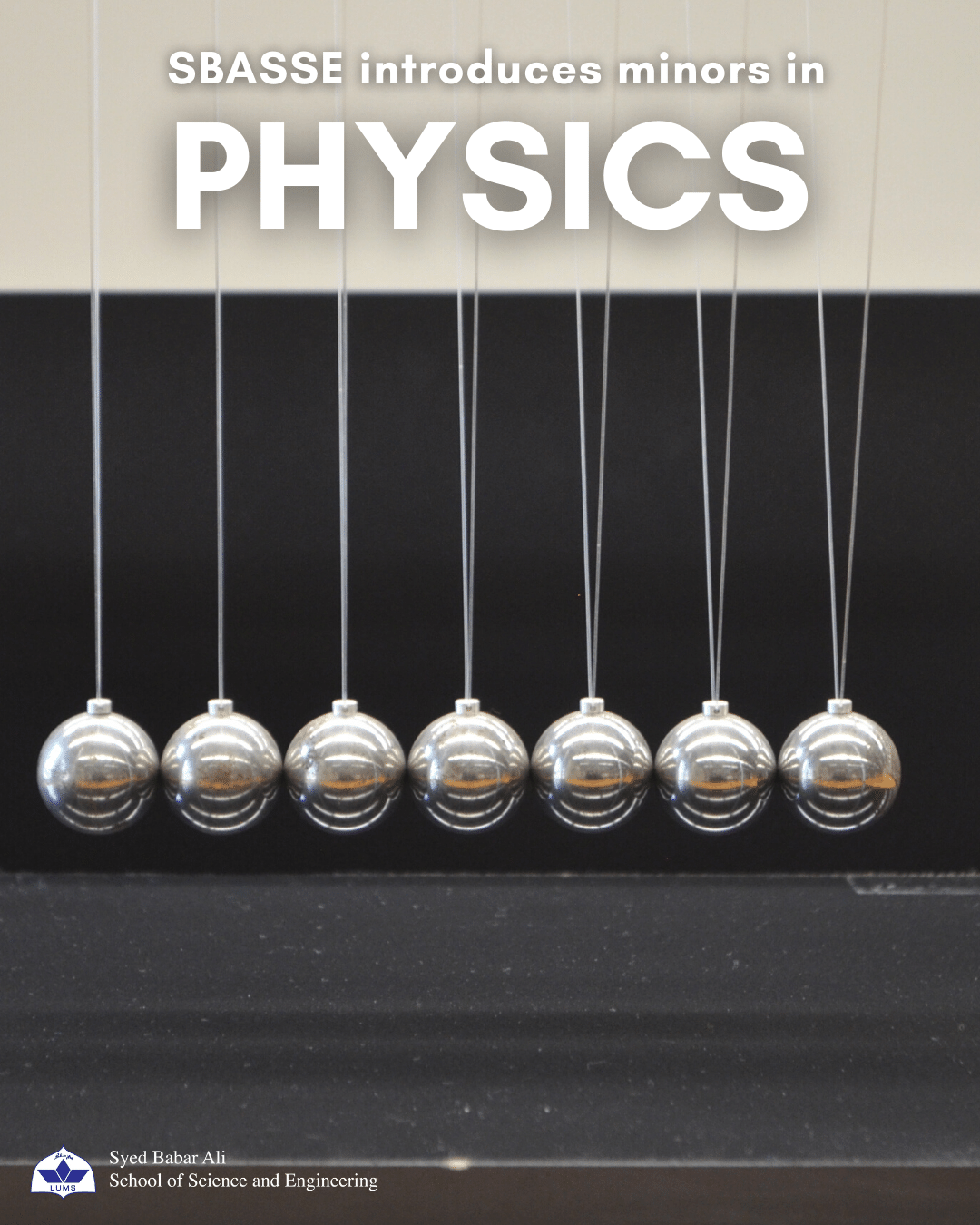
Robotics
Robotics is an interdisciplinary field that builds on several core engineering and science disciplines such as Electrical Engineering, Computer Science, Mechanical Engineering, Mathematics, and Physics. A robotic system typically involves environment perception, information processing & intelligent decision making, and physical actuation for accomplishing any assigned task. To design such a system, a robotics engineer needs a strong command on a diverse set of topics including kinematics, dynamics and control, signal processing, optimal planning, sensing systems, embedded systems, and intelligent decision systems.
Compulsory Courses
Students interested in pursuing a minor in Robotics will be required to follow the roadmap presented below. The students will have to successfully complete 6 regular courses in the following combination of core and elective courses
- EE220+L: Digital Logic Circuit with Lab - 4 credit hours
- EE324+L: Microcontroller and Interfacing with Lab - 3 credit hours
- EE310: Signals and Systems OR EE203: Engineering Models - 3 credit hours
- EE3002: Junior Design Studio - Robotics OR EE361+L: Feedback Control Systems with lab - 4 credit hours
- EE562: Robot Motion Planning OR EE565 Mobile Robotics - 3 credit hours
Elective Courses
One elective course from the following list:
- EE361+L Feedback Control Systems
- *EE 562 Digital Control
- EE569/CS6314 Dynamic Programming & Reinforcement Learning
- EE512 Digital Image Processing
- EE513/CS5310 Computer Vision Fundamentals
- EE565 Mobile Robotics
- EE562 Robot Motion Planning
- EE3002: Junior Design Studio - Robotics
- EE563 Convex Optimization
- EE578/CS594 Information Theory and Machine Learning
- EE567/CS6315 Multiagent Systems
Please note:
- *EE310 is a pre-req for EE361 and EE562. The students need to ensure that they satisfy these requirements.
- It is strongly recommended for students in Robotics Minor program to enroll in EE 200 Sophomore Design studio, which is a 1 credit course and provides a hands on experience of mechanical design of intelligent machines.
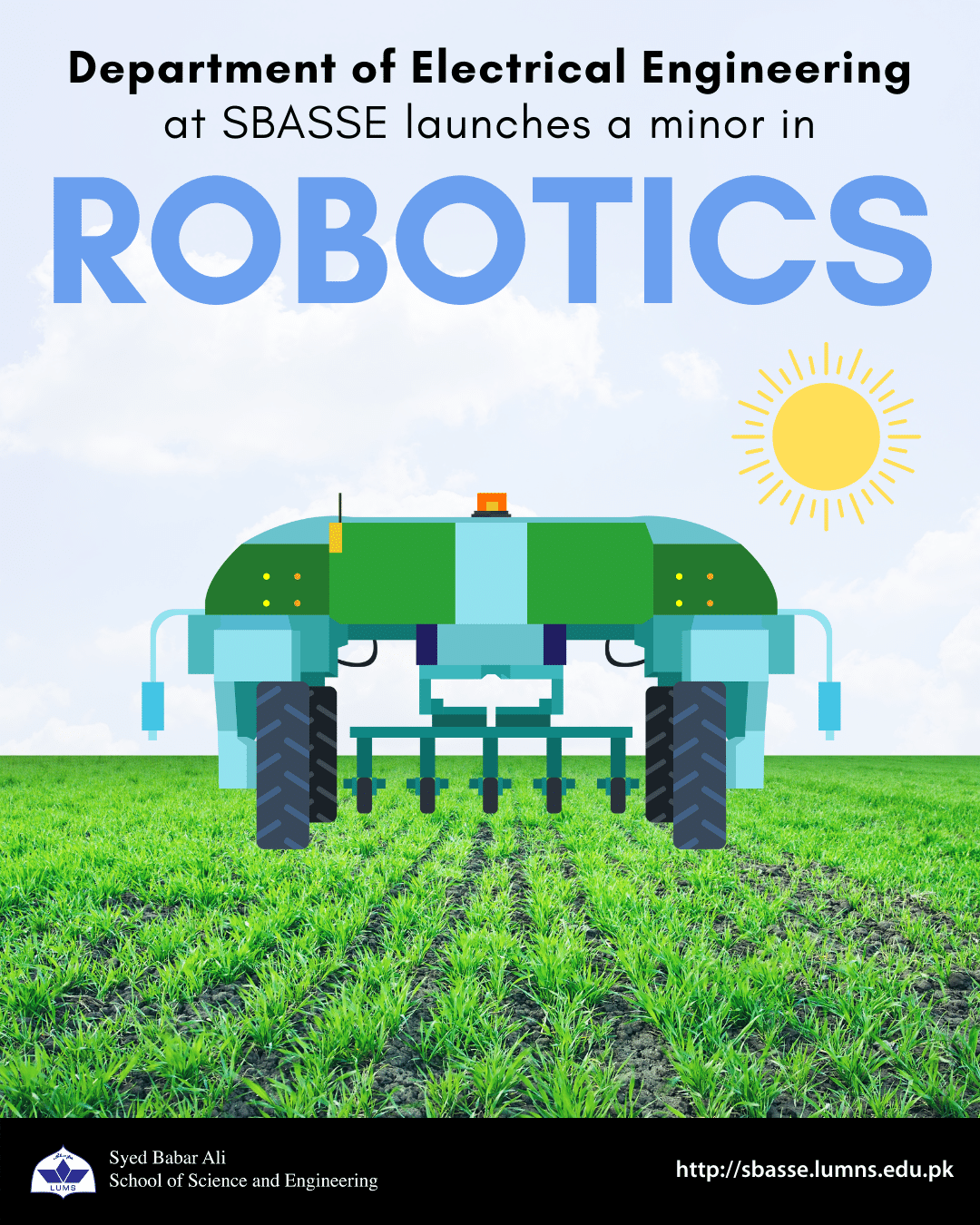
Quantum Technologies
Quantum technologies promise to revolutionize many different areas of technology in the near future. Examples include computing, communication, cryptography, imaging, and sensing. Development of such technologies involves the merging of different areas of physics, engineering, and computation. We propose a minor program in ‘quantum technologies’ that is meant to enable LUMS and SSE students, to become part of the quantum workforce enabling this quantum revolution.
Requirements
To complete the minor requirements, students will have to complete the following requirements (19
credit hours in total for SSE majors).
- Students must successfully complete the following two courses: PHY 212 (Quantum Mechanics 1) and CS 200 (Introduction to Programming)*.
- Students must successfully complete either PHY 307 (Introduction to quantum computing) or PHY
4xx/PHY 612 (Introduction to quantum information science) or An introduction to Quantum
Information Science and Technologies CS 5112/ EE 539 / PHY 612. - Students must successfully complete one course from the following: PHY 411 (Quantum optics),
PHY 5xx (Quantum algorithms). - Students must successfully complete any two additional courses from the following: the course
they did not opt for in requirement 2 above, the courses they did not opt for in requirement 3
above, PHY 312 (Quantum Mechanics II), PHY 512 (Advanced Quantum Mechanics), PHY 505
(Computational Physics), PHY 5331 (Atomic and Laser Physics), PHY 5xx (Quantum Lab).
* CS 200 can be counted as part of both the major requirement as well as fulfilling the requirement of the proposed minor.


